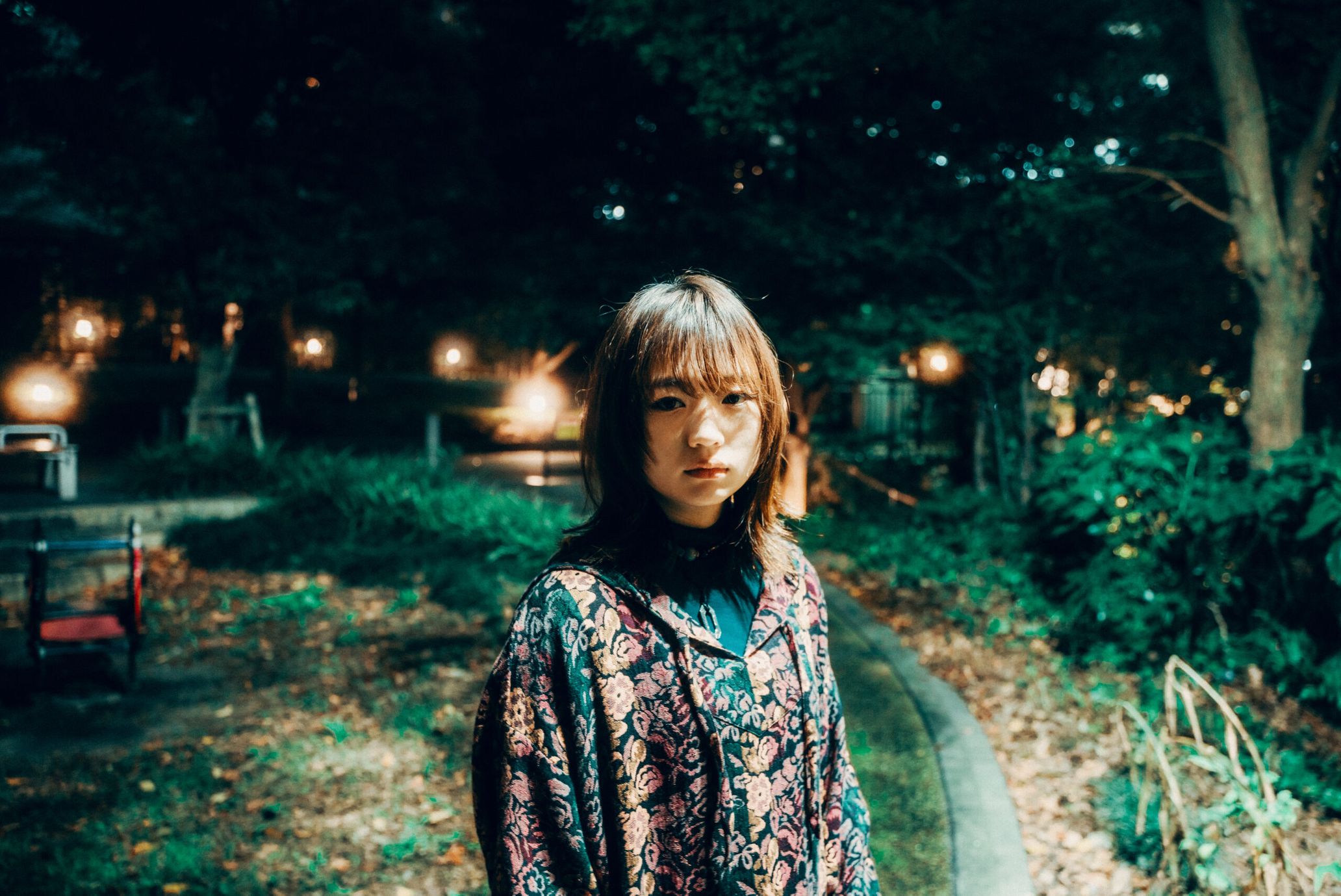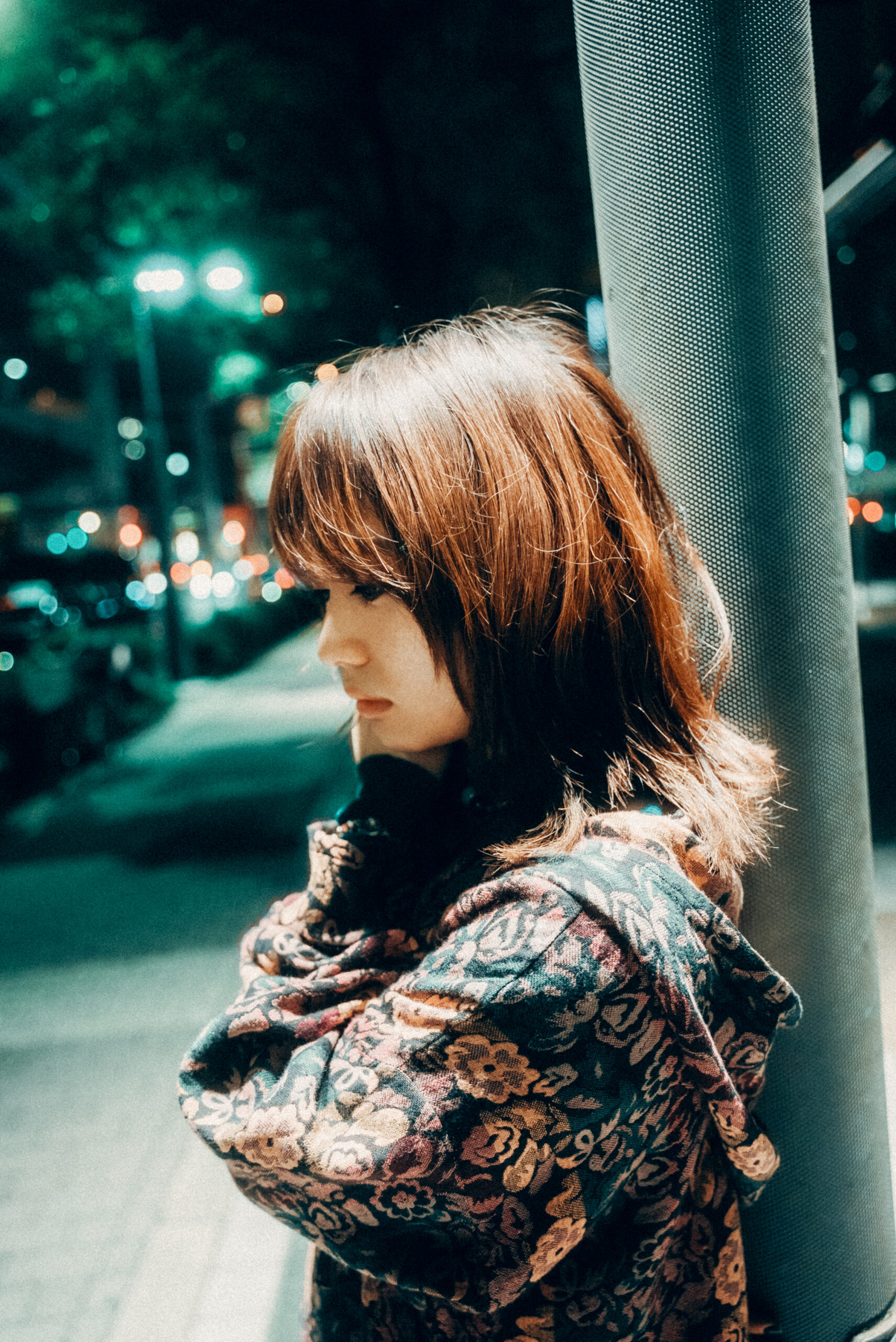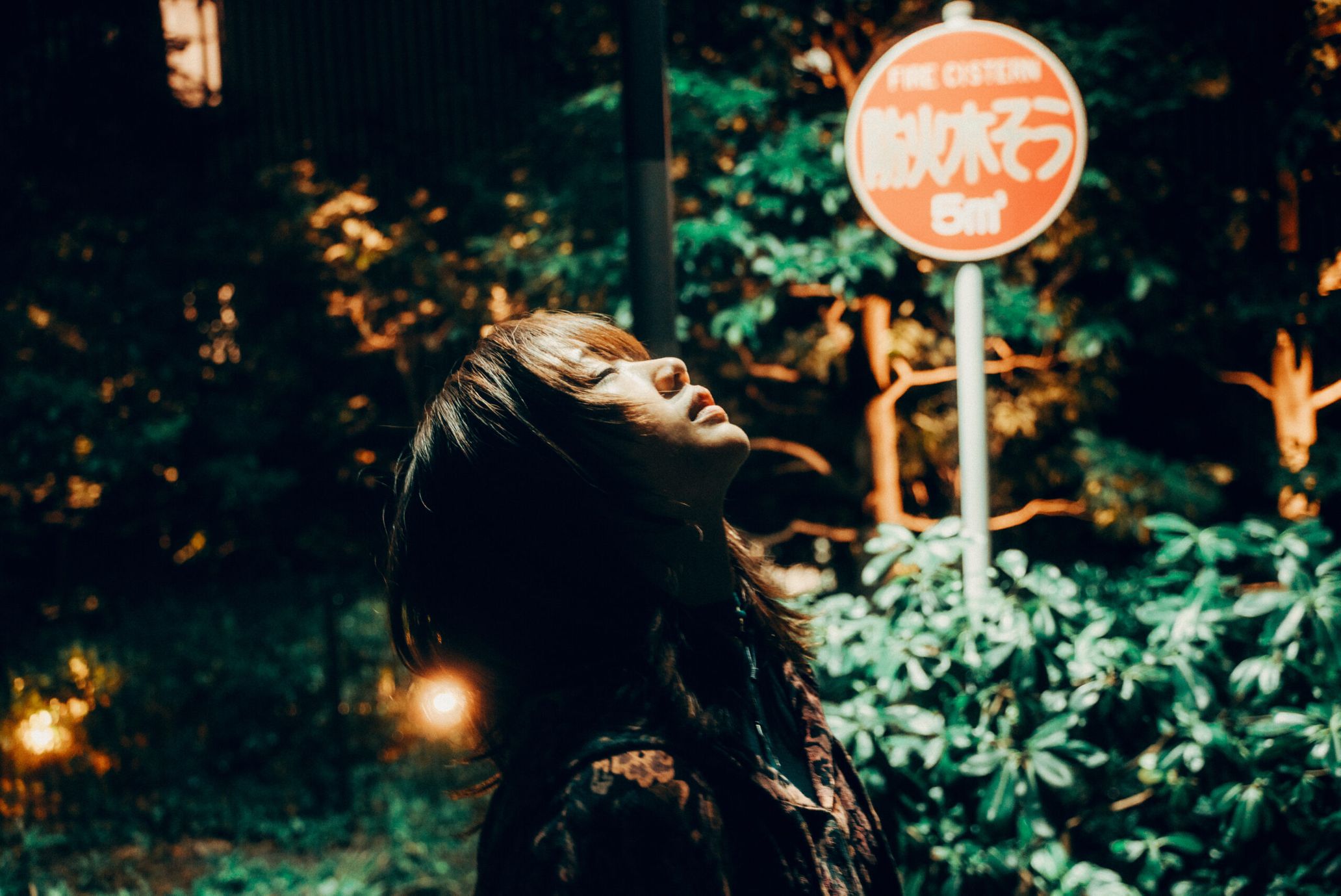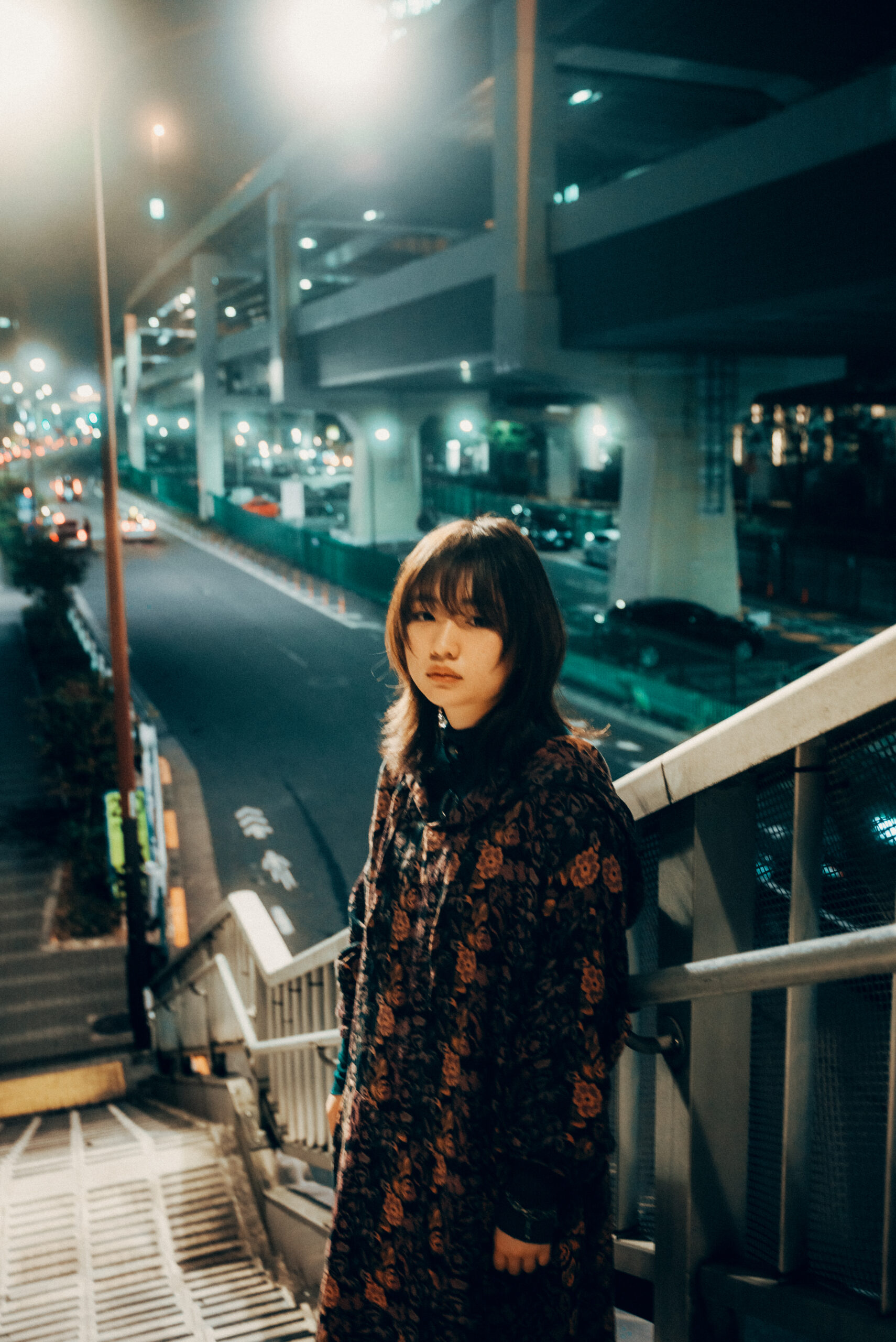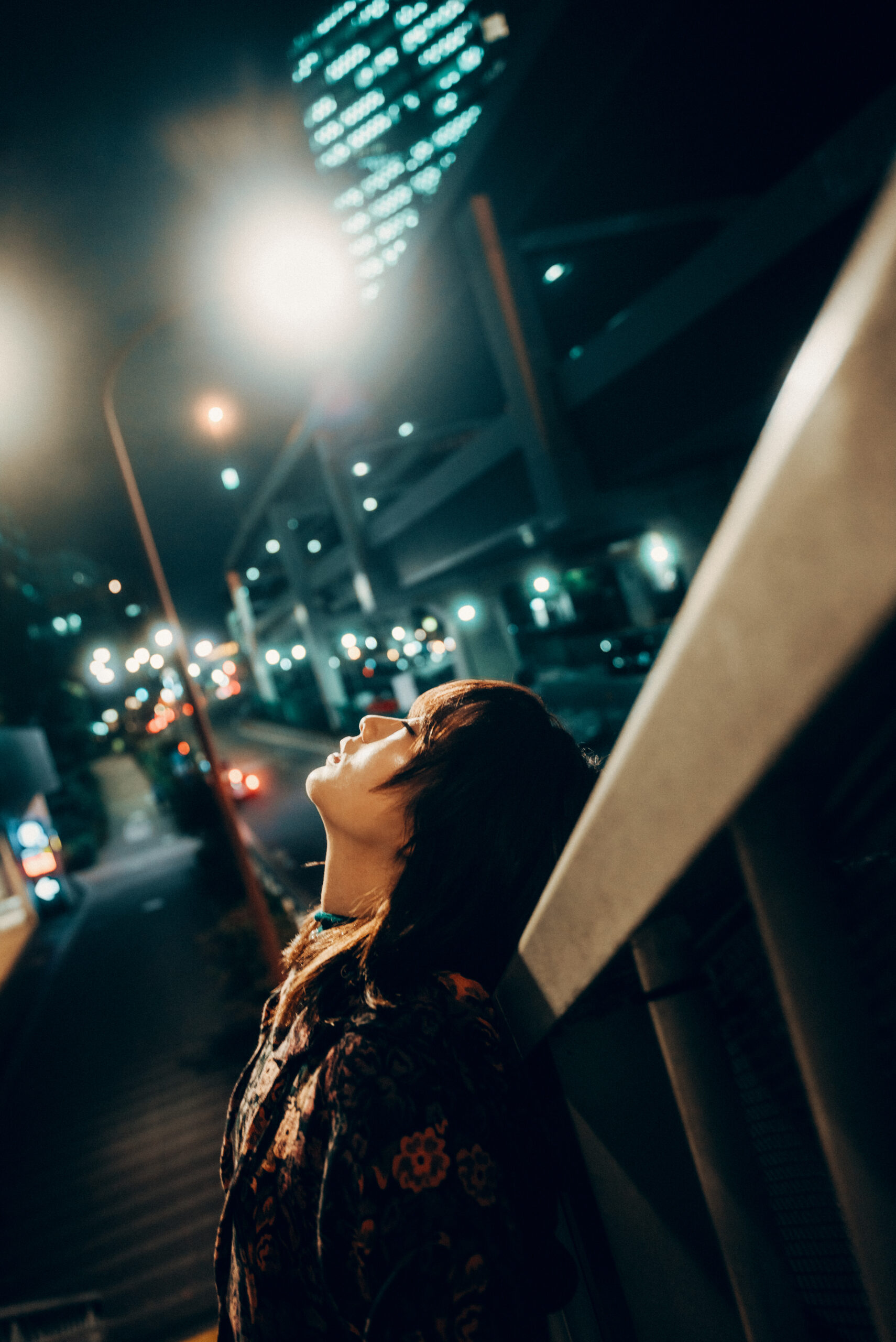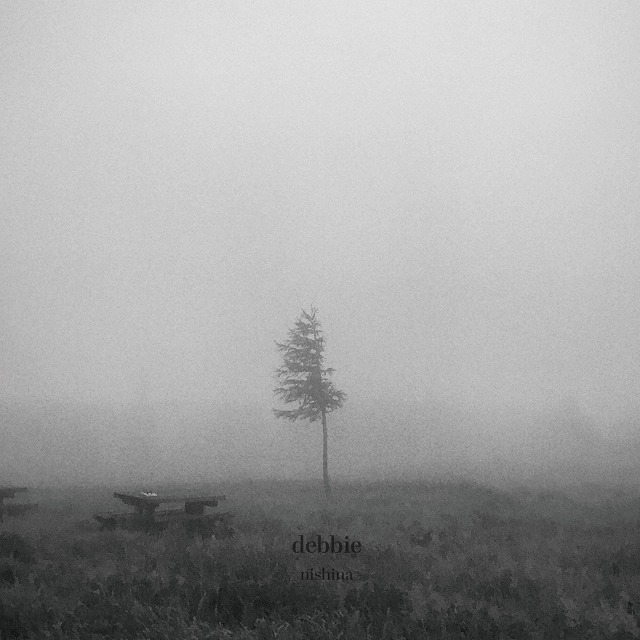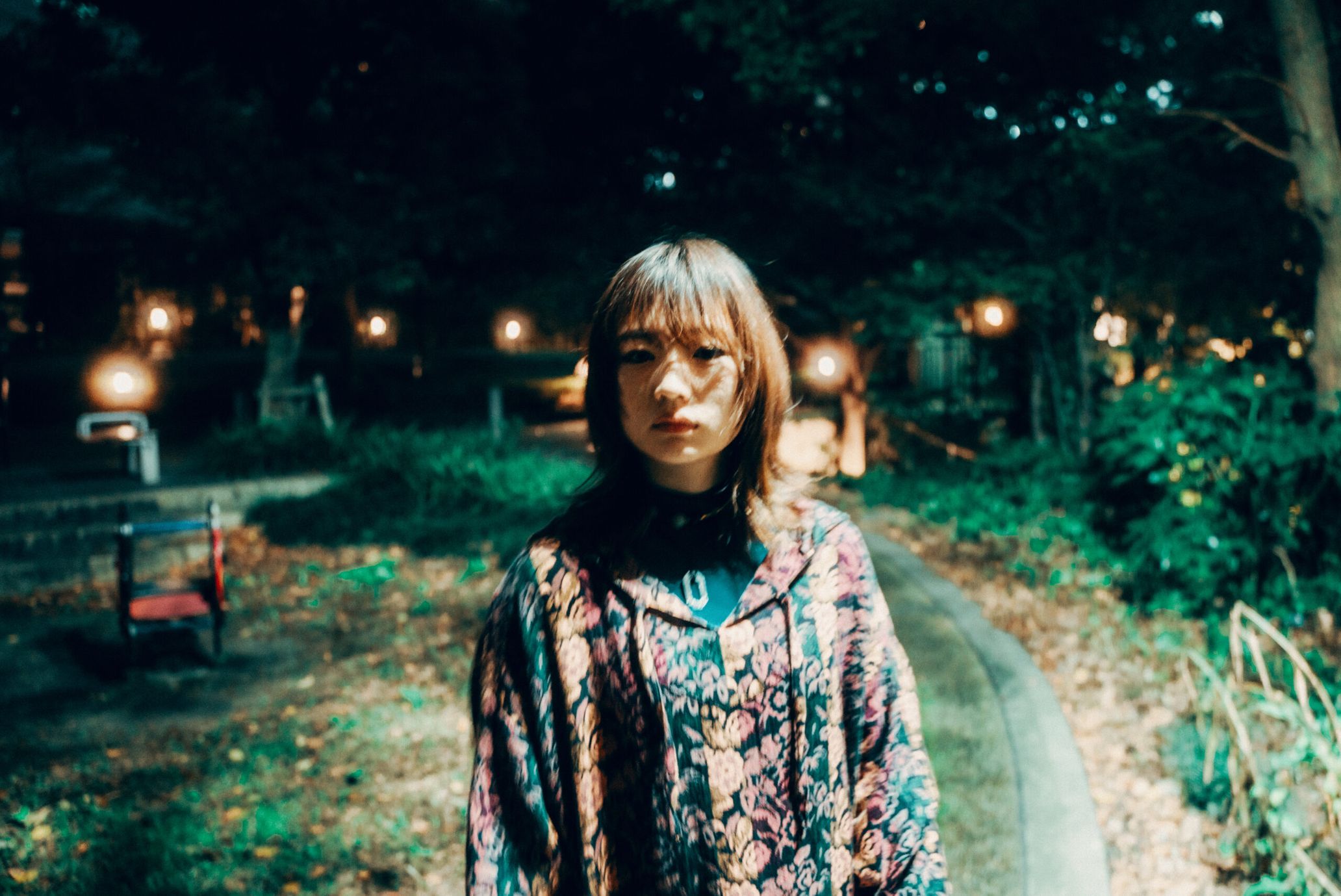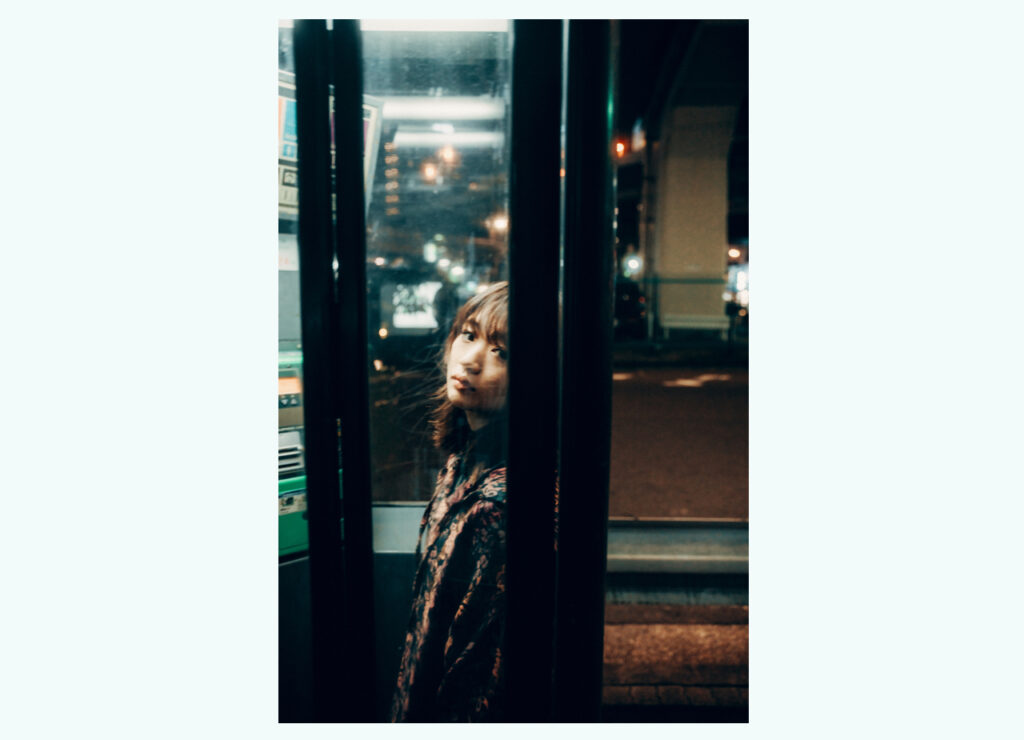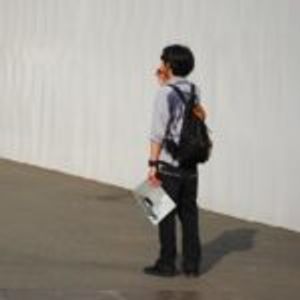With her transcendent crooning voice and highly addictive and mesmerizing melodies, artist Nishina captivates the heart of her listeners, musicians, and various music fans.
She is the rising star of the new generation who not only writes all her lyrics and music but also takes on artistic responsibilities from creating her videos, artworks, and visual assets. Her creativity is highly praised that she was chosen for Spotify’s RADAR Early Noise 2021; and in June, she accomplished her solo live performance at Zepp Tokyo. In October, she released the song “Yoruni Natte,” which she preciously kept since before her debut. Subsequently in November, she released her new song “debbie,” which she wrote in the midst of the Covid-19 pandemic and gleaned wide attention as it was used as a theme song for the film Zutto Hitori de Irutsumori?
If you only look at her career and reviews, you may think she is a mere nascent Gen-Z, J-POP star. However, she’s more than that—The world of her creations is imbued with happiness and despair, anxiety and hope, vulnerability and insanity, a ray of light, and complex realities we all confront on a daily basis.
Now, take a look at what Nishina has got to express through herself.
I’m mirrored in the core of the songs
ーーI heard that originally, you were dreaming of becoming a photographer when you were in elementary school. So, we’re you always wanting to express something?
Nishina: Since I was little, I’ve always wanted to become a singer, but since that was my biggest dream, I couldn’t open up about it to people. So instead, I was telling people that I wanted to be a photographer, which was my second biggest dream. In regard to expressing something, I’ve always liked making something from scratch, like the process of making zero into one.
ーーSo that means, you’re number one dream came true.
Nishina: That’s right.
ーーI know you write all your lyrics and music. When do you usually write?
Nishina: Before, I used to write songs based on what I wanted to sing at gigs. But, since music became part of my job, I try to have a creative mindset at all times, and I’m always looking for themes and words for my songs. Speaking of the emotional aspect, I think anger and sorrow are especially linked to my lyrics. Although, I’ve been less angry these days [laughs].
ーーAnd how do you write the melodies?
Nishina: Most of the time, it doesn’t come to me naturally. It’s usually while I’m strumming the guitar or singing covers of someone’s songs, the chords pop in my head, and I hum the melody. When the lyrics come first, I think of a melody that goes with it.
ーーLike you mentioned earlier, music has now become your job. So, would you say you’re tapped into music mode every day?
Nishina: I try to think about music every day, but sometimes I just forget about it, and then I’m like, “Oh no, I totally forgot about it. I gotta write something!” [laughs]. There are both rough times and fun times with my job.
ーーSo, how much of yourself do you think is mirrored in your music?
Nishina: It’s me at the core of the songs, and I’m adding on whatever I think is necessary to complete the piece. So, I would say 30% is me, and 70% is the elements needed for the music.
I don’t want to adhere to any notions nor force them on anyone
ーーThe song you released in October, “Yoruni Natte” is a song you wrote when you were 20, before your debut, right? I heard that this song is about when you were talking about homosexuality with your boyfriend at that time, and you couldn’t condone him for saying, “Did you know homosexuality happens when there’s a bug in the DNA?”
Nishina “Yoruni Natte”
Nishina: I don’t think he was aware that he was saying a terrible thing. But I remember thinking, “How could a feeling of liking someone be a ‘bug’?” I resented his remark.
ーーOther than with that incident, what kind of things do you condone and not condone?
Nishina: Maybe “not condoning” isn’t the right word for this. But I guess it depends on who you’re dealing with. I might’ve not been this emotional (with the aforementioned incident) if he (ex-boyfriend) were a complete stranger. But, since I liked him and we were close, I was extra sensitive with even the tiny things he said or did. So, I think it depends on the person and how close you are with that person.
ーーOf course, each person has their own way of thinking and feeling. Now, how would you define your perspective on values?
Nishina: I’m actually open to different ideas and thoughts. In fact, it’s fun and I like hearing them. On the other hand, I hate when people push their opinions on me. If that happens, I would burst with heated rage [laughs]. So, I try not to do the same thing to others.
ーーIn your past interview, you talked about “notions.” Do you hate the idea of being adhered to a specific notion?
Nishina: It’s hard living without having any notions, and it gets complicated if you get into this subject too deep…. But, if you adhere to a specific notion, at one point, you will inevitably need to deny yourself and others. That’s why I don’t want to stick to a particular belief nor force it on someone else.
ーーFor instance, when you’re talking to a friend and your friend shares a different opinion than yours, would you accept the other person and say something like, “Yeah, I guess that’s one way of looking at it” and stay friends with that person?
Nishina: Yes, I would. But, if that other person pushes his or her opinion and says, “No, you’re wrong,” I would probably push the person away [laughs].
ーーWhen did you start thinking this way?
Nishina: Looking back, when I was in elementary school, someone had told me, “You’re a girl, so you better wear a skirt.” And I thought, “Why is that?” Skirts are a regular item for school uniforms and women’s business suits.
ーーIn college, you studied gender studies, right?
Nishina: Yes. I started college after I wrote “Yoruni Natte.” I decided to study the subject because I didn’t like the part of me that wasn’t thinking openly. And that was related to my thoughts on gender. After I studied in college, I’ve realized that I’m made of various elements and became capable of seeing myself more objectively.
A strong feeling of “Wanting to be understood”, “Wanting to understand others”
ーーWhen making songs, do you ever focus on your femininity? I think your lyrics include things that only a woman can write.
Nishina: It’s never come to my attention until now that you‘ve brought it up. I’ve never written songs about being a woman and particularity from a woman’s perspective.
ーーAnd so, how would you define your current identity?
Nishina: That’s a tricky question…. Back when I was in middle school and high school, I struggled to find the answer to that, but now that I think back, I also didn’t want to know. I believe I’m going to keep changing from here and on. It’s like I don’t want to define who I am now so that I can let myself be whatever I want in the future. Yeah…the more I think about it, the more complex it gets. I guess I can say that I’m an ambiguous person, uncertain about everything.
ーーI feel like artists usually create something that reflects themselves. And I think they sacrifice some part of themselves to create something.
Nishina: In that sense, I think I always have a strong feeling of “Wanting to be understood” and “Wanting to understand others.”
ーーAh, I see.
Nishina: For example, with “Yoruni Natte”, the song is about rage that comes from a frustrating situation of not being able to understand the other person when you want to. But later, when you cool off, you might be able to find words that would make the other person understand you. So anyway, I think my prominent desire of “Wanting to be understood” and “Wanting to understand others” is underlying in my songs.
ーーSo, you intend to convey your feelings or sentiments thoroughly?
Nishina: Yes, I can’t quit that.
ーーBut it doesn’t seem like you’re exposing all your thoughts and emotions.
Nishina: It depends on the song, but essentially, I’m not the type who says whatever I think deep down in my heart. But sometimes I just put it out there and conclude on my own.
Now I think it’s okay to have songs that represent those particular moments, and it’s okay to express my dark side
ーーWhat about the song you released in November, “debbie”?
Nishina: That song especially sings about what I wanted to, or rather, what I needed to say out loud. Regarding the songs about relationships, including this song, I’m not addressing to everyone, and it’s to that one person I’m singing about. But I would be happy if the listeners listened and resonated with the songs when they’re going through a similar situation.
ーーDo you ever write songs thinking about the listeners’ point of view?
Nishina: I think I do think from the listers point of view when writing songs. There are times I write songs directly based off of my emotions, but generally, I keep my feelings aside and think, “How would it sound to others?”
ーーWhen read (visually), some parts of the lyrics could be a bit too intricate and hard to decipher, but it doesn’t feel that way once you hear it with the music.
Nishina: I’m happy to hear that.
ーーIt shows that you’re trying to deliver your messages through the songs.
Nishina: Maybe the arrangement of the song is helping, too.
ーーThe way you communicate song images to the arrangers is quite unique. I heard that you describe them with colors, right?
Nishina: That’s right. Although we’re talking music, I imagine the songs more in-depth and like they are movies. I share the worldview of the songs with the arrangers, but they interpret well and take it further. So, I think there are a lot of artistic expressions incorporated in the songs, more than what the lyrics could convey.
ーー“debbie” is used as a theme song for the film Zutto Dokushin de Iru Tsumori? And I heard you wrote the song during the pandemic. How did you spend your days during the pandemic?
Nishina: When the outbreak began, I was still in college, so I was working on my graduation thesis. I thought I shouldn’t see anyone, so I was staying in alone.
ーーYou were a student and an artist. So from that standpoint, what kind of thoughts did you have during the pandemic?
Nishina: When I was thinking solely about my life, as I couldn’t put out the works that were ready to be released, I was worried about the future. But then I realized that I should take the time more positively and focus on what I could do to be prepared for what’s to come ahead. But I admit, because the situation wasn’t changing for so long, I was feeling dark and depressed.
ーーDo you think that feeling is reflected in your songs?
Nishina: Yes, I think so. I’d thought that it’s not a good idea to write songs that are too dark, but now I think it’s okay to have songs that represent those times and express my dark sides. As long as my music is out there, someone is listening.
ーーProbably, one of the reasons the listeners connect with you is because you embed your honest emotions into your songs. But, again, would you say music is the ultimate medium of expressing yourself?
Nishina: I would say yes. Right now, music is the most accessible medium for me to express myself. It’s because I genuinely like singing. I truly feel joy in it. Growing up, I didn’t watch that many movies but listened to a lot of music, so I guess that’s why music is rooted in me. But I’m also curious to try out many different things, like making my own videos.
I take part from scratch for all my videos—I share my opinions and discuss the details, such as the color tones and textures, as thoroughly as possible
ーーYou’ve worked with many directors for your music videos, including Sara Masuda, Koshun Mamiya, Spikey John, Motherfucko, Takuya Uchiyama, and Kodai Kobayashi. Also, “Yoruni Natte” was directed by the sought-after Miss Beam from Hong Kong. How do you usually divide roles when working together with these creators?
Nishina: It depends on the song, but I was especially involved in making the video for “Yoruni Natte.” I told the director, “The song portrays two women, but the nitty-gritty is not about them, and I want you to capture love in a bigger way and simply express yourself.” I also told her the image I had in my head: red mixing with blue and eventually turning into a dull color. Usually, I take part from scratch for all my videos and decide the details as thoroughly as possible. I share my opinions and ideas on the color tones and textures, and we discuss and move forward together.
ーーAlso for “debbie”, I heard you were deeply involved in making the music video. So, you worked together with Sara Masuda?
Nishida: Initially, I wasn’t planning to make a music video for that song. I was just eager to make a video on my own. I had a hard time deciding whether I should do it on my own or with someone else, and eventually, I decided to ask Sara to work with me.
Nishina “Debbie”
ーーWhat’s the concept of this MV?
Nishina: It’s a sad song, but the girl is joyfully laughing, and there’s someone precious shown in the video, so I wanted the viewers to feel like they’re watching someone’s nostalgic memory. There isn’t a story to this video, and I hope people could broadly feel like they’re sinking themselves into nature. To effectively capture the sentiment, we shot the video in Gunma and Hokkaido.
ーーHow was it creating this video?
Nishina: It was really fun. Also, at the same time, I felt even more grateful to the directors who’ve worked with me in the past. Making a video is indeed hard [laughs]. But, if I get a chance again, I would love to do it again.
ーーYou’re involved in a wide variety of works as an artist. What is your vision for your future?
Nishina: I can’t think of too far ahead in the future, but I would definitely love to go and sing in many different places in the near future. I’ve been putting out songs consistently, but I haven’t had the chance to go on tour yet. I genuinely want to meet people who listen to my music.
And…well, it’s a tough question. I’m quite capricious and a liar who isn’t good at lying [laughs]. So anyway, I guess I’m going to continue making whatever I feel like making in the moment.
Nishina
Nishina is a new generational artist emerging with her transcendent singing voice. Her music is composed of a soft yet vulnerable, addictive, and somewhat nostalgic voice, pleasant melody lines, and exuberant and animated yet delicate words. Turmoil lurks within the tranquility of her music. Her voice and music gradually seep through and captivate the listeners and quietly yet progressively disseminate through the world.
https://nishina247.jp
Instagram:@247nishina247
Twitter:@nishina1998
YouTube:nishina_official
■Nishina Solo Live Show Tora Tora
Artist: Nishina
Date
:April 2, 2022 OSAKA NHK Osaka Hall
:April 17, 2022 TOKYO Nakano Sunplaza Hall
Time:OPEN 17:00 / START 18:00
Entrance: ¥5,950
https://nishina247.jp/
Photography Kuuga
Styling Koromo Ishigaya
Hair & Make-Up Eriko Yamaguchi
Text Analog Assasin
Translation Ai Kaneda

